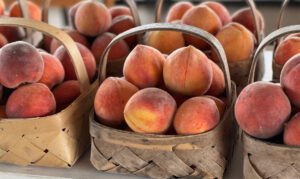Skillful little hands worked at a steady pace from early in the morning until well into the night, wasting no time. Spring rains would soon fall, swelling creeks and streams that fed his lake. The work had to be finished by then or all (including his new family) might be lost.
He didn’t know his mate yet, but he knew if he built it, she would find him. With his two large razor-sharp teeth, he dug deeply into the soft wood of saplings that grew around the lake in abundance. His strong jaws sent chunks of white wood flying in all directions.
Soon, another tree had fallen, and the smaller limbs were quickly discarded – only the log was needed. Dragging the log back down the sandy bank, the little beaver slipped in the cool waters of the lake swimming with his prize. It would be the first of a hundred such trips.
He was aware that he was the smallest of his kind who lived in the large lake, but that didn’t bother him. It just meant he had to work harder than all the rest. Beavers don’t think much about anything else other than chewing wood, toppling trees, and of course, building dams for nesting. And as a dam maker, he was better than most. After all, even though he was small, he was still a beaver.
Reaching the mouth of a small creek that fed the lake, he set the log just so. Placement of the log wasn’t done haphazardly. Its placement, along with that of all the other logs, had a purpose: to build the strongest dam. One misplacement could weaken the entire dam or even cause it to fail utterly.
Instinctively, he checked the log once more before paddling off to the nearby shore for another sapling. It took the rest of that day and two more before his dam was finally finished. When it was, a female beaver swam over and …
Suddenly a frustrated voice floated up from the backseat interrupting our early morning golfcart ride around Twin Lakes. “No, Papa. That’s not how it happens.” Our Sweet Caroline was getting irritated. I’d left out the most important part of her story. A story she had just imagined out of the blue.
As we slowed down, the large family of ducks who live at the lakes started their chorus of quacking while waddling over to see if we had something for them to eat.
“You forgot to tell people about the branches.” Looking over at The Wife, we both were smiling. Witnessing the active mind of an eight-year-old budding storyteller was quite entertaining and quite remarkable.
Both she and her older sister, Little One, often play for hours telling each other stories, but not like this. This one was truly special, giving an insight to the workings of her mind. Trying to start the story once more, I was again interrupted by Sweet Caroline.
“Papa, no. It doesn’t go like that. Let me tell it.” And for the rest of our time at the lakes, she did. “You see, there once was a little beaver in a lake, and he wanted to build a dam. He swam over to the bank, cut down a branch with his big teeth — then swam back over where a creek came into the pond and started building his dam.”
“Cutting down small trees sounds better. You see, as a writer, you have to paint a —”
“Papaaaa! Stop interrupting me! That’s not nice.” Our little redhead was getting very annoyed at her Big Papa. I apologized, and she continued. “He used limbs. And the first limb he used to build his dam he called Math.”
The Wife and I exchanged confused looks. This was a twist in the story even I couldn’t have envisioned, so I had to ask, “The log was called Math?”
“Branch, Papa! And it was called Math. Math was the most important branch in the beaver’s dam. You gotta have math. Without it, you won’t be able to add and subtract stuff.”
I couldn’t argue with her logic. As the family of ducks continued waddling towards us in search of food, we stopped so Little One could jump off. Immediately, she started a playful game of tag with the large black one we call Papa Duck. The Wife leaned over whispering, “Honey, let her tell her story.” Then she asked Caroline, “What happened next?”
“Well, the beaver swam back over to the sandy bank, chewed another branch, and swam back with it to the dam. He placed it just right.”
I was halfway joking when I asked, “Did the branch have a name?”
Our little storyteller answered nonchalantly, “Yes, the second branch was named Science. And it was the most important branch. You gotta have science to understand things.”
“I thought you said Math was the most important branch?” My question was rewarded with a quick poke in the ribs from The Wife. I got the message. “OK. Then what?”
“He swam over, chewed off another tree branch, swam back adding it to his dam. This one he called Art, and it was the most important one. Art is fun. Then he got another one, added it to his dam calling it English. With English, you can write so it was the most important one. The next branch was Recess. It was the most important one because you got to stay in shape to stay healthy. Then he added a branch called Music …”
“It was the most important one, right?”
“Papa, stop!”
Another poke from The Wife. “Sorry.” I said, “Was the little beaver finished with his dam?”
“No, he got more branches. Music made him happy, so it was the most important. He also got Social Studies, so he knew history and stuff. It was the most important. And the last one he called Teacher.”
“I don’t understand,” I asked. “How can all the branches be the most important? And what is the little beaver’s dam holding back?” The Wife and I are still amazed at Sweet Caroline’s reply.
“All the branches are most important because they all are a part of your brain. Your brain is what the branches are holding, and if you’re missing one part of your brain, it’s not good. That’s why the Teacher is the most important branch of all. She knows all about all the other branches.”
And with that, Sweet Caroline’s story was finished. Jumping off the golf cart again to continue the sporting game of duck tag with her sister, she left the Wife and me dumbfounded. “Well, what do you think of her story?” She asked.
“I learned two things. First, it was amazingly simple and yet incredibly complex and creative at the same time.”
“And the second thing?”
“I’m not nearly as smart as our eight-year-old granddaughter.”
[Rick Ryckeley has been publishing stories in The Citizen since 2001.]












Leave a Comment
You must be logged in to post a comment.